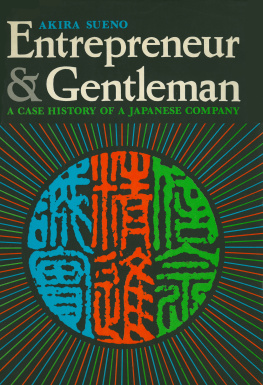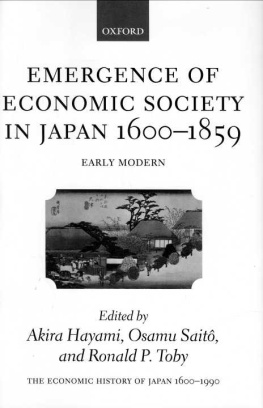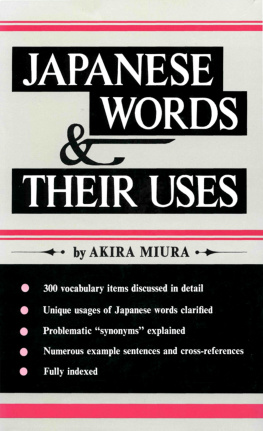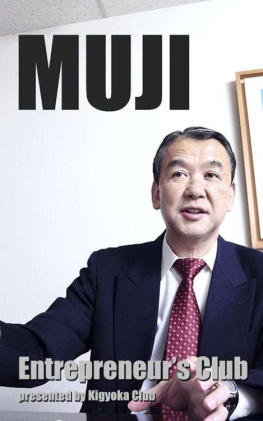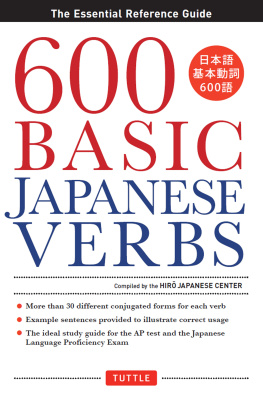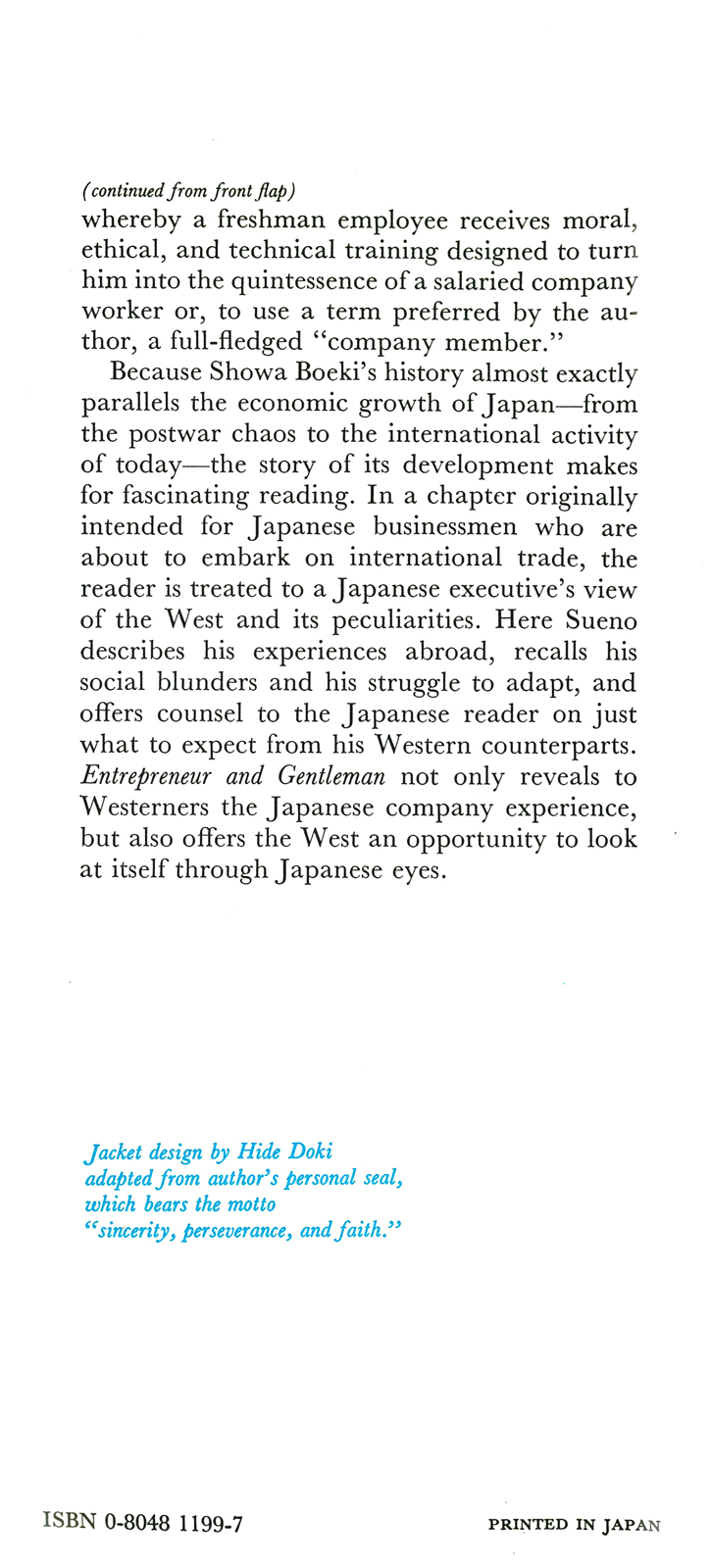Appendix
CHRONOLOGY OF AKIRA SUENO
AND THE SHOWA GROUP
September 1877 | Gonnosuke Sueno, Sr., founds the parent company, the Sueno Hachimokudo pharmacy, at Karamono-machi, Higashi-ku, Osaka. |
January 1901 | The second generation: Gonnosuke Sueno, Jr., takes over the family business. |
October 1913 | Akira Sueno is born in Osaka. |
January 1923 | Old Showa Building completed. |
April 1936 | Akira Sueno enters the firm of Sueno Hachimokudo, after graduation from Kobe University (March 1936). |
January 1937 | Establishes Showa Building, Inc., leasing office space in Showa Building. Enters military service (rank at wars end is intendant captain, accountant officer). |
June 1941 | Enters what is now Nissan Parts and Machine Tools, Ltd., during brief demobilization from army. Drafted again, after three months, for army service in Taiwan. |
March 1946 | Returns to civilian life; re-enters Nissan. |
April 1950 | Promoted to chief, Nissan general-affairs section. |
December 1950 | Resigns from Nissan to take over as third generation in family business. |
January 1952 | Reorganizes and incorporates original Sueno Hachimokudo firm under new name, Showa Boeki Co., Ltd., and serves as its president. |
November 1959 | Serves as assistant leader, Hong Kong economic research tour, sponsored by Osaka Prefectural Foreign Trade Promotion Association. |
October 1960 | Establishes and serves as president of Sueno Co., Ltd. (autonomous general merchandise subsidiary of Showa Boeki: sale of leisure products, imported womens clothing and ornaments, and other consumer goods). Continues management of Showa Building, Inc. |
November 1963 | Receives Osaka prefectural governors prize for contributing to foreign trade. |
March 1965 | Phoenix trademark is officially registered. |
November 1965 | Appointed first president, Osaka Packaging Materials Association. |
October 1966 | Appointed vice-chairman, planning committee to establish Asian Packaging Federation; dispatched as special emissary, Japan Packaging Institute, to numerous countries in Southeast Asia. |
September 1967 | Forms 3-P (Phoenix Packaging Party) Association for Showa Boeki customers and agents. |
January 1968 | Establishes and serves as president of Showa Phoenix Industrial Co., Ltd. (autonomous manufacturing subsidiary of Showa Boeki: manufacture of packaging materials, machinery, and other industrial goods). |
May 1969 | Showa Boeki receives special mention in Umi o Wataru Shokon (The Spirit of Business Crosses the Seas), published by the Nihon Keizai Shimbun (Japan Economic Daily), one of the most respected newspapers in Japan. |
January 1971 | Represents Japan at directors meeting, Asian Packaging Federation, Hong Kong. Establishes and serves as president of Phoenix Packaging System Institute Co., Ltd. (research, development, and sale of packaging system technology). |
November 1971 | First convention of 3-S Association (business suppliers of Showa Boeki). |
March 1973 | Receives letter of gratitude from Japan Packaging Institute for contributions to international trade in the field of packaging materials. |
September 1974 | Completion of New Showa Building (9 floors plus basement) on old Showa Building site. |
March 1976 | Receives Medal of Honor with Blue Ribbon award. |
PROFESSIONAL ACTIVITIES OF AKIRA SUENO
President, Osaka Prefectural Foreign Trade Promotion Association
Vice-president, Osaka Packaging Institute
Director, Japan Packaging Institute
Director, Osaka Prefectural Trade Association
Director, Osaka Merchandise Center
Director, Japan Citrus Importers Association
Supervisor, International Consulting Service Association
Consultant, Japan Packaging Machinery Association
Committee Member, Kansai Committee for Economic Development
Member, French Packaging Institute
Member, Osaka Club
Member, Toyonaka Rotary Club
Books to Span the East and West
Investing in Japanese Securities: Profit and Protection for the Intelligent Investor by John B. Bennett and Norman Doelling
The Japanese Employee by Robert J. Ballon
Toward an Orderly Market: An Intensive Study of Japans Voluntary Quota in Cotton Textile Exports by John Lynch
Modern Japans Foreign Policy by Morinosuke Kajima
A Brief Diplomatic History of Modern Japan by Morinosuke Kajima
Japanese Etiquette: An Introduction by the World Fellowship Committee of the Tokyo Y.W.C.A.
The Japanese Are Like That by Ichiro Kawasaki
Japan Unmasked by Ichiro Kawasaki
Japan and America: Language, Culture, and Personality by Bernice Goldstein and Kyoko Tamura
Bushido: The Soul of Japan by Inazo Nitobe
The Book of Tea by Kakuzo Okakura
Charles E. Tuttle Company:
Publishers
by the same author (in Japanese)
Hachijugo-Shunen ni Saishite, 1962
(On Our 85th Anniversary)
Sekai Akinai no Tabi, 1966
(Business Trips Around the World)
Shinobu-gusa (ed.), 1971
(Collected Essays in Memory of My Father)
Akinai no Dohyo, 1974
(Milestones in Business)
Entrepreneur and Gentleman
CHAPTER
Subsistence Business
HOW MARVELOUS that it can never be predicted at what age a person will find his calling! Is it not because of this fact that one dreams the eternal dream of future happiness and burns with the will to live, stirred to ardor by the work before ones eyes?
When young I had visions of globetrotting as a foreign service officer. At that time Japan was still basking in the victorious though minor part she played in the First World War, having not long before won wars against both China and Russia. Capitalism was in the early period of its expansion and growth in Japan, and beginning to spread its benefits. It was a time when becoming a mounted bandit in Manchuria was the dream of many a boy.
As I said in the Introduction, I was all of 38 years old when I embarked on my chosen career. It is difficult enough to begin amidst postwar economic chaos, but starting out when you are middle-aged has its own problems. Contending with these problems made up what I call my Subsistence Business phase.
My Fathers Counsel
Our Showa Boeki Co., Ltd. celebrated the 92nd anniversary of its founding in September 1969; it was January 25, 1952 when I reorganized it and gave it its present name.
Up until then I had been employed as the chief of the general-affairs section of Nissan Parts and Machine Tools, Ltd., after having spent 10 years in the army. Because of the postwar economic situation the family business existed in name onlythe affiliated Showa Building was our only enterprise left over from the bombing. Then, before we knew it, we were practically under occupation by our creditors, their patience worn thin. Since my father was on occasion incapacitated by illness, he could not continue to run the business; any mistakes would surely have shortened his life. Being the only son, I felt it my filial duty to help him out, and so resigned voluntarily from the company where I had planned to stay my whole life. It was November of 1950, and I had just passed my 37th birthday.

